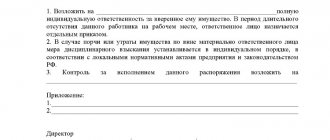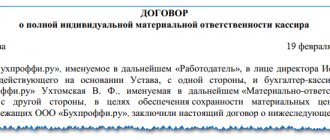Is early termination possible?
Early termination is permitted if a person leaves the company or is transferred to another position. Let's assume that a cashier salesperson is transferred to the position of an accountant.
It is necessary to conclude an agreement with him on the termination of the contract on material liability, since the employee will no longer be responsible for the safety of the goods and received funds.
You can terminate the contract for any other reasons. For example, an employer, on his own initiative, decided to release an employee from liability.
Then, an additional document is issued. an agreement to the employment contract that the provision on financial liability no longer applies to the specified position.
If such a document was concluded with the employee, but his work and position are not included in the special list of Resolution No. 85, it cannot be considered valid.
Therefore, the employee has the right to demand cancellation of the document by application. If the employer does not agree to comply with the requirement, you can go to court with a statement of claim.
Step-by-step termination procedure.
Termination of the agreement on full individual financial liability
Section 3. Procedure for concluding a liability agreement
An agreement on liability can be concluded, as noted earlier, only with a person who has an employment relationship with the organization. The employment relationship begins from the moment the employment contract is concluded. In accordance with Article 56 of the Labor Code of the Russian Federation, an employment contract is an agreement between an employer and an employee, according to which the employee undertakes to personally perform the labor function determined by this agreement, subject to the rules of internal labor regulations, and the employer - to pay the employee wages in a timely manner and in full and to provide conditions labor provided for by labor legislation, collective agreement and agreement of the parties. It should be noted that in the new edition of the Labor Code of the Russian Federation, introduced by Federal Law No. 90-FZ of June 30, 2006, which comes into force on October 6, 2006, the employer can be either an organization or a private entrepreneur.
An employment contract is concluded in writing. Hiring is formalized by an order (instruction) of the organization's administration, which is presented to the employee against signature, and actual admission to work is the moment the employment contract is concluded, regardless of whether the hiring was properly formalized or not.
If an employer wishes to enter into a liability agreement with an employee, he must check whether such a desire satisfies the conditions already discussed above, such as:
• The employee has an employment relationship with the organization;
• The employee has reached the age of eighteen;
• The employee is directly related to the maintenance, storage, release, processing or use in the production process of material assets entrusted to him or the storage and maintenance of funds.
• The position of the employee or the work performed by him is contained in the List of positions and work replaced or performed by employees, approved by Resolution of the Ministry of Labor of Russia dated December 31, 2002 No. 85 “On approval of the lists of positions and work replaced or performed by employees, with whom the employer can enter into written agreements contracts on full individual or collective (team) liability, as well as standard forms of contracts on full liability.” The list is closed.
In practice, it is possible that all the conditions for imposing financial liability are met, but the employee refuses to enter into an agreement on full financial liability. In this case, there are all grounds for imposing a disciplinary sanction on the employee in connection with failure to fulfill labor duties in accordance with Article 192 of the Labor Code of the Russian Federation. In case of repeated failure by an employee to fulfill his job duties without good reason, the employee may be dismissed under paragraph 5 of Article 81 of the Labor Code of the Russian Federation. To do this, the employer must document the fact that the employee was notified of the employer’s desire to enter into a liability agreement and the fact that the employee refused to sign it.
For example, you might suggest composing a notice with the following content:
The form of the agreement on full individual liability is given in Resolution of the Ministry of Labor of Russia dated December 31, 2002 No. 85, which can be used in its standard form, or supplemented or modified depending on the specifics of the organization. In particular, the contract can establish additional requirements for the equipment of the premises where valuables are stored, for example, requirements for temperature conditions in storage areas, additional locks, etc.
It should be noted here that explanations regarding the application of disciplinary sanctions in the event of an employee’s refusal to enter into an agreement on financial liability were given by the Plenum of the Supreme Court of the Russian Federation in paragraph 36 of Resolution No. 2 of March 17, 2004. It, in particular, stated that “with permission disputes arising in connection with the application of disciplinary measures to employees who refused to conclude a written agreement on full financial responsibility for the shortage of property entrusted to employees (Article 244 of the Labor Code of the Russian Federation), in the case where it was not concluded simultaneously with the employment contract, it is necessary to proceed from next.
What are the features of dismissal of the person responsible
The Labor Code examines the issue of financial liability upon dismissal, establishes a closed list of grounds for releasing an employee from a position and describes the procedure for formalizing the termination of an employment contract.
The employer has no right to terminate the contract on grounds not specified in the Labor Code of the Russian Federation, or to neglect the established procedure. An employee has the right at any time to decide to terminate an employment contract and submit an application without explaining the reasons for his decision. The company has no right to retain an employee.
But if we are talking about a financially responsible person, his care is complicated by the fact that he is officially assigned the obligation to store the employer’s property. Before terminating an employment contract, the employer is obliged to accept this property from him. The dismissal of a MOL is accompanied by additional procedures for inventory and transfer of responsibility for material assets to another employee and the execution of additional documents - a transfer and acceptance certificate.
dogovor_o_mat_otvestvennosti.jpg
Related publications
If, in accordance with his job duties, an employee makes payments to clients, is responsible for accounting and preserving valuables, and works with the employer’s expensive property, it is worth concluding a liability agreement with him.
The positions of employees with whom it is possible to conclude an agreement on full individual financial responsibility are indicated in a special List, approved. Resolution of the Ministry of Labor of Russia No. 85 of December 31, 2002. Thus, the list includes such positions as cashier, warehouse manager, heads of trading enterprises, etc.
- With employees under 18 years of age (minors). However, this does not mean that such employees do not bear any responsibility for the destruction of property or its damage - if the damage was caused intentionally, while intoxicated or due to the commission of a crime, they bear full financial responsibility;
- Employees who are registered under the GPA (for example, under a contract). In this case, the citizen is obliged to compensate the company for damages without any additional agreements between the parties.
In practice, there are situations when an employee’s job function includes duties that imply financial responsibility and those that do not. For example, a driver performs the duties of a freight forwarder. The position of a driver is not on the list approved by the Ministry of Labor, but the position of a forwarder is. In this case, it is also possible to conclude an agreement on financial responsibility with the employee, but in terms of those of his duties that allow it.
General procedure for dismissing a financially responsible person
The grounds for termination of an employment contract are divided into groups:
- at the initiative of the employee;
- dismissal of a financially responsible employee at the initiative of the employer. Unlike an employee, an employer needs clear grounds to make a decision to terminate a contract;
- by agreement of the parties, when the employee and the employer enter into an agreement to terminate the contract and stipulate in it all the conditions for terminating the relationship that are important to them;
- due to circumstances that are beyond the control of either the employee or the employer.
For whatever reason, an employee is dismissed, instructions on the procedure for dismissing a financially responsible person under Art. 84.1 Labor Code of the Russian Federation:
Step 1. Receive an application.
Step 2. Issue a dismissal order.
Step 3. Familiarize yourself with it under the employee’s signature.
Step 4. Complete the transfer of valuables.
Step 5. On the last day of work, issue a work book with an entry made in it, other documents related to the work, at the request of the employee, and make a cash payment.
Healthy:
- instructions for dismissal at your own request;
- instructions for drawing up a dismissal order;
- instructions for filling out a work book upon dismissal.
The nuances of terminating an employment contract
If an employee has written a letter of resignation of his own free will, then the head of the enterprise or an authorized official has the right to demand that the specialist work for a 14-day period, which begins the day after the application is submitted. Exceptions are situations when an employee cannot complete work for serious reasons - joining the army, enrolling in full-time studies, serious illness and other circumstances that indicate the impossibility of working. Upon completion of work, the employee must receive a payment, as well as a work book.
Additionally, a certificate of the full amount of accrued earnings may be provided. The presence of material claims against an employee does not relieve the employer of the obligation to promptly issue the employee a paycheck and provide a work book. Delay can be fraught with administrative and even criminal liability - when an employer does not pay employees wages for a long time or commits fraudulent acts with the property of the enterprise.
The financially responsible person is obliged to perform an inventory, i.e. check the integrity of the assets provided for responsibility with their original condition. The procedure for performing an inventory is outlined in the Methodological Instructions of the Ministry of Finance of the Russian Federation No. 119n. Based on the results of the inspection, the employer’s property is transferred to a new responsible specialist. If the new employee is not yet employed, then the property must be transferred to the person temporarily replacing the financially responsible specialist.
Expert commentary
Platonov Alexander
Lawyer
There may be situations when it is difficult to quickly carry out an inventory, and its duration exceeds two weeks. The employer does not have the right to delay payment to the employee and refuse to provide a work book. The Labor Code of the Russian Federation does not contain legal provisions providing for the possibility of extending work. The employer has an obligation to dismiss the employee on the last day of work, according to the Labor Code of the Russian Federation.
If the head of a company or other official is faced with a shortage or theft of property, he has the right to file a claim in court and demand compensation from the employee for material damage. At the same time, an obligation may be imposed to compensate for damage to the company’s reputation if material theft led to problems with counterparties, contributed to inspections by law enforcement agencies, and negative coverage of the company’s problems in the media.
The employer also has the right to convince the employee to withdraw the application for termination of the employment contract at his own request. Then the labor relationship can be terminated on the basis of the Labor Code of the Russian Federation - Art. 78. This option is a compromise for the parties and will allow the employee to submit financial reporting in a timely manner.
At the initiative of the employer
If the dismissal is carried out at the initiative of the employer, then forced termination also does not relieve the employee of the obligation to submit reports and conduct an inventory. Forced dismissal is permitted on the grounds provided for in the Labor Code of the Russian Federation - Art. 81.
Termination of an employment agreement at the request of the employer may be provided for in the following situations:
- when an employee constantly violates labor discipline and appears at the workplace in a state of intoxication;
- systematic absenteeism;
- theft of employer property;
- disclosure of company trade secrets.
Dismissal of an employee is also possible if the employee is prosecuted, taken into custody or sentenced to actual imprisonment. Termination of an employment contract is permitted when an employee has lost the trust of the employer, discredits the reputation of the profession - teacher, educator, law enforcement officer, etc.
Expert commentary
Kireev Maxim
Lawyer
Regardless of the grounds for termination of an employment contract, employers, including budgetary enterprises and institutions, must provide the employee with a calculation and issue a work book.
Features of voluntary dismissal
The employee initiates his/her own resignation through his/her application. The instructions on how to fire a financially responsible person on your own are not fundamentally different from other grounds, but there are nuances. The actual departure is preceded by two weeks of work - this is the minimum period during which the employee, as a general rule, is obliged to notify the employer of his intention to leave the organization. If an employee wishes to shorten his working period, he must either have a clear, valid reason or an agreement with the employer. But such an agreement is formalized by agreement, the grounds are reclassified as “by agreement of the parties.”
In the event of the departure of a financially responsible person, a reduction in the working period is not beneficial to either the employee or the company. In a standard two weeks, the organization will have time to take inventory and properly accept the valuables.
Is inventory necessary?
The list of cases when an audit is necessary is established by clause 22 of Order No. 119n of the Ministry of Finance of Russia dated December 28, 2001. It is said that taking inventory when dismissing a financially responsible person is necessary and mandatory. Paragraph 258 of the same document establishes that a financially responsible person is relieved of his position only after a complete inventory of all material assets.
The responsibility for organizing the inventory lies with the employer; he must have time to carry it out during the period of employment of the resigning person.
How to conclude an agreement on full financial liability
Every company has employees whose professional responsibilities are closely related to the material assets of the organization. The cashier issues and receives cash, the storekeeper stores and issues goods, and the forwarder escorts cargo. For all this they bear full financial responsibility. The legislator established the right of the employer to enter into a special agreement with such employees - an agreement on the full individual financial responsibility of the employee (cashier, for example).
With whom can you sign a full financial liability agreement?
The list of positions and works filled or performed by employees with whom it is possible to conclude a standard agreement on full individual financial liability for shortages of entrusted property was approved by Resolution of the Ministry of Labor dated December 31, 2002 No. 85.
The list consists of two sections. The first indicates positions with which it is possible to conclude an individual agreement on full individual financial responsibility for 2021. The second lists the types of work, the implementation of which also allows you to conclude a financial liability agreement.
The employer does not have the right to enter into written agreements on financial liability if the position or specific work is not provided for in the specified List.
Agreement form
The standard form of an agreement on full financial liability is provided for by Resolution of the Ministry of Labor of Russia dated December 31, 2002 No. 85. Accordingly, there is no need to develop it yourself. You can download a free liability agreement (2019 sample) and use this form. There is no need to issue an organization order.
Download
How to conclude an agreement
The goal is to compensate for the loss in full. To complete the 2019 full liability agreement document, please see below. The absence of such an agreement will not make it possible to bring the employee to full financial responsibility.
If a document (in the attachment you will find a sample agreement on full individual financial responsibility; Yandex can also help with this kind of information) is filled out for a new employee, it is important to make sure of the following:
- the job description contains responsibilities specified in the List, or the name of the position itself is included in the List;
- The employment contract itself reflects the condition of financial responsibility.
Why is this necessary? In case the hired employee decides to refuse to assume obligations. According to para. 2 clause 36 of the Resolution of the Plenum of the Supreme Court of the Russian Federation dated March 17, 2004 No. 2, if the performance of duties for the maintenance of material assets is the main job function of the employee, which is agreed upon when hiring, and by virtue of the current legislation, an agreement on full financial responsibility can be concluded with him , which the employee knew, refusal to conclude such an agreement should be considered as a failure to fulfill labor duties with all the ensuing consequences.
What to do if inventory is delayed
The employer does not always have the opportunity to complete the inventory before dismissing the employee: there is not enough two-week work period or the employee leaves earlier, which is possible if he resigns due to retirement.
If the moment of dismissal occurs before the end of the inventory, the company does not have the right to forcefully retain the citizen in his position. In such a situation, there are two options:
- dismiss the employee before the inventory is completed, and if a deficiency is subsequently identified, recover it through the court;
- agree with the resigning person on dismissal by agreement of the parties and determine in the agreement the date that will occur after the end of the inventory.
IMPORTANT!
The transfer of material assets upon dismissal of one's own free will is an important and mandatory part of the procedure for dismissing the person responsible. The organization of this process is the responsibility of the employer.
How to transfer material assets
Valuables are transferred according to an acceptance certificate, which is approved by the head of the organization or another employee who is authorized by the head to approve such documents.
After the values are accepted from the resigning employee according to the act, they are transferred to the new financially responsible person. Both termination of an employment contract and the appointment of financially responsible persons are carried out in agreement with the chief accountant of the organization.
The procedure for transferring values
There are two generalized models for the transfer of values, and neither is standardized by law .
- The first is that a candidate for the vacant position that is being vacated has not yet been found.
- The second is that there is already another employee ready to start work the next day after the predecessor leaves the position.
Let's consider the first model. It is clear that the work related to maintaining the organization’s property cannot be entrusted to the first person who comes along. Therefore, finding a candidate may take some time. Under such conditions, it is worth looking for a replacement among the company’s employees.
ATTENTION! Valuables should not be transferred to employees with whom it is impossible to conclude a full agreement. responsibility. Such a mistake can cost the employer dearly. The legislation does not allow the employer to enter into an agreement with all employees of the enterprise.
If the agreement was signed with an employee of the organization, whose job responsibilities (work performed) are not on the list set out in the said resolution, the employer will not be able to hold him accountable and recover damages from him.
You should not transfer valuables or enter into an agreement with a person who is not officially hired for the position.
- Before dismissal, the employee transfers the valuables to the commission, which conducts an inventory.
- The room where material assets are stored (a safe with monetary values) is sealed by the commission.
- The next day, after the dismissal of the previous employee is formalized, a new one is hired and the valuables are transferred to him.
It is this kind of procedure that is provided for by the legislation of the Russian Federation.
You can learn more about changing a materially responsible employee and transferring his responsibilities to another here.
What to do if there is a shortage
The shortage is the resulting difference between the actual volume of material assets and the planned balances.
| There is no shortage | The financially responsible person is relieved of his position without any claims against him. |
| Shortage identified |
|
How to properly collect the shortage
The Labor Code allows three options for repaying the deficiency:
- Voluntary. By agreement between the company and the citizen, repayment may be made in several payments; the citizen has the right, by agreement, to provide property of equivalent value.
- By order of the employer, which is permissible subject to the following conditions:
- the amount of the shortfall does not exceed the employee’s average earnings;
- the order was issued within a month from the moment the shortage was identified;
- the citizen is still an employee of the organization.
- In court, if the conditions for out-of-court recovery are not met. This arrangement is often the most likely: since the citizen leaves the company, collection by order becomes impossible.







